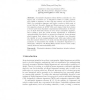Free Online Productivity Tools
i2Speak
i2Symbol
i2OCR
iTex2Img
iWeb2Print
iWeb2Shot
i2Type
iPdf2Split
iPdf2Merge
i2Bopomofo
i2Arabic
i2Style
i2Image
i2PDF
iLatex2Rtf
Sci2ools
SEC
2007
2007
Security Remarks on a Convertible Nominative Signature Scheme
A nominative signature scheme allows a nominator (i.e. the signer) and a nominee (i.e. a designated verifier) to jointly generate and publish a signature so that only the nominee can check the validity of a nominative signature and further convince a third party to accept this fact. Recently, Huang and Wang proposed a new nominative signature scheme at ACISP 2004, and claimed that their scheme is secure under some standard computational assumptions. In this paper, we show that their scheme is not a secure nominative signature, since it fails to meet the crucial security requirement of verification untransferability. Specifically, we present an adaptively chosen-message attack against their scheme such that the nominator can determine the validity of a new message-signature pair with some indirect help from the nominee. Moreover, we point out that this attack enables the nominator to demonstrate the validity of nominative signatures to a third party. Therefore, the Huang-Wang scheme ...
Nominative Signature Scheme | Nominative Signatures | SEC 2007 | Secure Nominative Signature | Security Privacy |
| Added | 30 Oct 2010 |
| Updated | 30 Oct 2010 |
| Type | Conference |
| Year | 2007 |
| Where | SEC |
| Authors | Guilin Wang, Feng Bao |
Comments (0)

